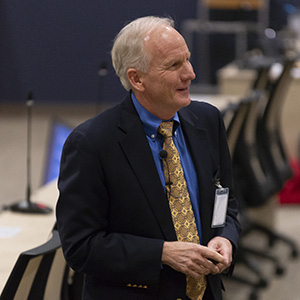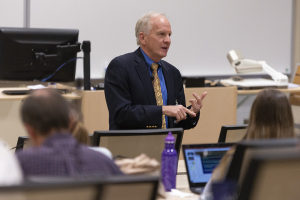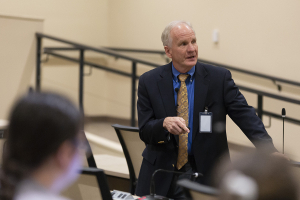Friday, February 21, 2020

Biomedical Frontiers Seminar Series 2019-2020
Chris Breedlove | LUCOM Marketing
Liberty University College of Osteopathic Medicine (LUCOM) Center for Research hosted its fifth Biomedical Frontiers Seminar Series (BFSS) of the academic year on Wednesday, Feb. 19, featuring Michael L. Smith, PhD. His presentation was titled Physiological Effects of Osteopathic Manipulative Treatments in Humans. Dr. Smith is a professor and the director of multidisciplinary programs at the University of North Texas Health Science Center, and also serves as the year-1 pre-clinical curriculum director at Texas College of Osteopathic Medicine.
 “Dr. Smith has had a very productive career as a biomedical sciences faculty member at the University of North Texas Health Science Center and the Texas College of Osteopathic Medicine. He is well-respected as a research scientist and as a medical educator,” said Joseph W. Brewer, PhD, associate dean for research.
“Dr. Smith has had a very productive career as a biomedical sciences faculty member at the University of North Texas Health Science Center and the Texas College of Osteopathic Medicine. He is well-respected as a research scientist and as a medical educator,” said Joseph W. Brewer, PhD, associate dean for research.
Dr. Smith’s research presentation shared an in-depth focus on how a research question is defined and the strategies for addressing the question are developed. It primarily focused on questions relating to how osteopathic manipulative treatments (OMT) can affect autonomic control of the cardiovascular system. “Today, the goal of my presentation is to help you [student-doctors] better understand the need for scientific evidence to support clinical approaches, how to identify the questions that need to be addressed, and to realize that there are ample opportunities to contribute to the future of medicine by participating in research that provides the scientific basis for therapies.”
Three main points were conveyed during the afternoon presentation: 1) there remain many gaps in the knowledge of how OMT works, 2) OMT can significantly affect autonomic function particularly in altering cardiovascular regulation, and 3) there are opportunities to continue to further the understanding of the scientific basis of OMT treatments.
According to Dr. Smith, his research in this specific area started from two personal experiences where he experienced the benefits of OMT treatments. He recalled that during his tenure at a college of osteopathic medicine, he came to realize that his research skills and knowledge of how to study autonomic function created opportunities for him to contribute to the evidence of mechanisms by which OMT can affect physiological function.
“The work that Dr. Smith presented today provided LUCOM faculty and students an excellent example of how biomedical scientists can investigate the physiological effects of OMT. As an osteopathic medical school, it’s important that we are aware of this research that seeks to understand the mechanisms underlying the effects of OMT on patients,” added Dr. Brewer.
 “Medicine is ever evolving, primarily through systematic research that occurs at medical schools. I think series like this [BFSS] are critical for medical students,” said Dr. Smith. “It is important for students to understand the value of research and to recognize that they actually have opportunities to contribute to the small steps that collectively lead to the evolution of new best practices and understanding.”
“Medicine is ever evolving, primarily through systematic research that occurs at medical schools. I think series like this [BFSS] are critical for medical students,” said Dr. Smith. “It is important for students to understand the value of research and to recognize that they actually have opportunities to contribute to the small steps that collectively lead to the evolution of new best practices and understanding.”
Dr. Smith also went on to explain that the other value of events like the BFSS is that it allows scientists and physicians to communicate more. “The interaction often leads to new approaches to answering questions and future collaborations.”
Dr. Smith also serves as a foundational biomedical sciences chair in the physiology division for the National Board of Osteopathic Medical Examiners (NBOME).
The next Biomedical Frontiers Seminar Series will occur on Wednesday, March 18, at noon. It will feature Herman F. Staats, PhD, professor and vice chair of research, in the department of pathology, at Duke University Medical Center. His presentation is titled New Applications for Nasally-delivered Vaccines: Treatment for Food Allergy and Drugs of Abuse.